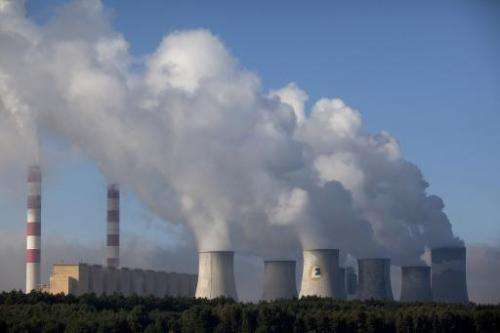EU bids to revive carbon market on eve of Warsaw climate meet

EU governments closed ranks Friday in a bid to resuscitate their moribund carbon emissions market meant to combat global warming, just three days ahead of crunch UN climate talks in Warsaw.
The European Union said it would freeze 900 million tonnes of carbon dioxide emissions quotas in the hope of reviving prices on its ill-fated Emissions Trading Scheme (ETS).
The agreement to "backload" or postpone the release of these credits to the market until 2020, is intended to push up prices for the quotas traded by more than 11,000 companies.
Although news of the decision gave the market an immediate boost, quota prices remain at less than a third of their level at the start of 2013, at under five euros ($6.70).
An EU source said the bloc anticipates prices rising to "between eight and 12 euros" on the back of this "one-off measure."
That however would still leave prices well short of the 25-30 euros which analysts deem necessary to make the ETS work properly.
The ETS was designed as a market for CO2 quotas as part of the EU's wider effort to cut down on pollution and especially the greenhouse gases blamed for global warming.
The assumption was that quota prices would run high enough to encourage companies to invest in new, more environmentally friendly technology.
In the event however, with quota prices so low, businesses have found it cheaper to buy the quotas to cover their CO2 pollution rather than invest in cleaner technology.
The decision won the backing of 26 EU states but Poland—heavily dependent on polluting coal for its power—and Cyprus voted against the move which has been pushed hard by the European Commission for months.
One of the world's most outspoken defenders of coal and the other big EU polluter alongside Germany, Britain, Italy and France, Poland chairs next week's meeting of the UN Framework Convention on Climate Change (UNFCCC).
Germany and Spain swung behind the measure only on Friday, EU sources said.
And one source taking part in Friday's talks said Berlin indicated it wants concessions from EU partners and an easing of rules governing emissions in the auto sector, a key German industry which is hostile to new EU standards.
The ETS market has two billion too many tonnes of carbon credits on the market, with 8.5 billion tonnes due to be sold between 2013 and 2020.
"Common sense prevailed," said EU Climate Action Commissioner Connie Hedegaard.
The European Parliament gave its blessing for the measure in July.
"There is a pressing need to redress the carbon price and reassure markets that the EU is serious about ensuring the proper functioning of its ETS," the Lithuanian EU presidency said.
Friday's decision "sends a strong signal to Warsaw," said one EU negotiator.
The negotiator insisted that the "dark years" for climate policy in Europe are over, despite expected battles over the auto and aviation sectors.
The EU is moving towards a target of a 40-percent reduction in emissions compared to 1990 levels by 2030, after a 20-percent target by 2020.
"Gradually, we are getting there," the negotiator said.
In October, the European Environment Agency said that by the end of 2012, the EU had reduced output of greenhouse gases by nearly 18 percent.
© 2013 AFP

















